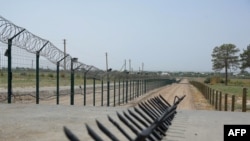Authorities in Uzbekistan have dismissed as “untrue” reports that militants linked to Islamic State had launched a rocket attack against the country from neighboring Afghanistan.
The denial comes a day after the terrorist group claimed its Afghan affiliate, the Islamic State Khorasan Province, or ISKP, fired 10 rockets Monday morning from the northern Afghan province of Balkh, targeting a military unit in Termez on the Uzbek side of the border.
The Uzbek Defense Ministry on Tuesday released a statement on its website noting the country’s border with Afghanistan “is fully controlled by the Uzbek military and is stable.”
Islamic State released a picture and video of Monday’s alleged rocket assault, claiming it was launched from somewhere in the border town of Hairatan in Balkh, according to Site Intelligence Group, which tracks terrorist propaganda.
The Uzbek Defense Ministry urged its citizens not to believe such “false” reports and rely only on “official sources” of information.
Afghanistan's ruling Taliban on Tuesday also denied the reported attack, saying the situation on the border between the two countries “is normal and there is nothing to worry about.”
“Reiterating its pledge, IEA as a responsible government assures all neighboring countries that all our border security forces are controlling the borders, allowing none to disrupt security,” said a Taliban foreign ministry statement, which used the official name for the Taliban, the Islamic Emirate of Afghanistan, or IEA.
ISKP has increased attacks in and around Afghanistan following the U.S.-led foreign military withdrawal from the country in August after 20 years.
The group has carried out several attacks in neighboring Pakistan, including a deadly suicide bombing of a Shi’ite mosque in the northwestern city of Peshawar last month.
The attack killed more than 60 worshippers from the minority sect and wounded scores of others. Pakistani authorities said the bomber was an Afghan refugee who received training in Afghanistan.
Pakistani Taliban attacks
Meanwhile, the Pakistani Taliban (TTP), designated as a global terrorist group by Washington, has also stepped up attacks in Pakistan from its Afghan bases since the foreign troop withdrawal and the Taliban's return to power.
Authorities in Islamabad say leaders and fighters of the banned anti-Pakistan militant outfit have established bases in Afghanistan after fleeing Pakistani counterterrorism operations and are plotting cross-border attacks against security forces.
Pakistani officials say that since the start of the year, more than 100 Pakistani military officers and soldiers have been killed in TTP-plotted roadside bombings and gun attacks in remote districts on the Afghan border.
On Sunday, the Pakistani Foreign Ministry urged Taliban rulers in Afghanistan to take "stern actions" against militants staging cross-border attacks on security forces in Pakistan.
"Pakistan has repeatedly requested Afghan government in last few months to secure Pak-Afghan border region,” the ministry said in a statement. “Terrorists are using Afghan soil with impunity to carry out activities inside Pakistan."
The statement came a day after the Taliban accused Pakistan of carrying out deadly airstrikes inside Afghanistan. They summoned Islamabad's ambassador in Kabul to the foreign ministry to protest the alleged early Saturday strikes that reportedly killed up to 40 people in the Afghan provinces of Khost and Kunar.
The casualties and the alleged Pakistani airstrikes could not be verified through independent sources.
Islamabad has been pressing the Taliban to rein in TTP activities since the Islamist group seized control of Afghanistan last August.
It is widely known that the TTP provided recruits and sheltered Afghan Taliban commanders on the Pakistani side of the porous border between the two countries to launch insurgent attacks against the then-Western-backed government in Kabul and international troops inside Afghanistan.




